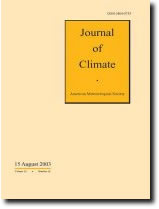This article includes a list of references, related reading, or external links, but its sources remain unclear because it lacks inline citations .(January 2022) |
 | |
| Discipline | Climatology |
|---|---|
| Language | English |
| Publication details | |
Former names | Journal of Climate and Applied Meteorology |
| History | 1988–present |
| Publisher | American Meteorological Society (United States) |
| Frequency | Biweekly |
| Delayed, 1 year | |
| 5.380 (2021) | |
| Standard abbreviations | |
| ISO 4 | J. Clim. |
| Indexing | |
| ISSN | 0894-8755 (print) 1520-0442 (web) |
| Links | |
The Journal of Climate is a biweekly peer-reviewed scientific journal published semi-monthly by the American Meteorological Society. It covers research that advances basic understanding of the dynamics and physics of the climate system on large spatial scales, including variability of the atmosphere, oceans, land surface, and cryosphere; past, present, and projected future changes in the climate system; and climate simulation and prediction.